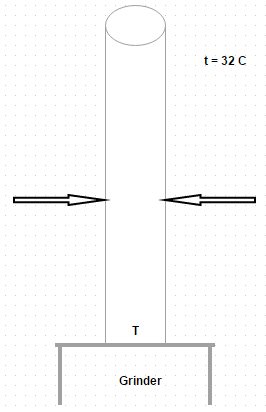Question

a.
161.45 degree celsius
b.
151.45 degree celsius
c.
141.45 degree celsius
d.
131.45 degree celsius
Posted under Heat Transfer
Interact with the Community - Share Your Thoughts
Uncertain About the Answer? Seek Clarification Here.
Understand the Explanation? Include it Here.
Q. The figure shows a 5 cm diameter rod, 90 cm long, which is having its lower face grinded smooth. The remainder of the rod is exposed to 32 degree Celsius room air and a surface...
Similar Questions
Explore Relevant Multiple Choice Questions (MCQs)
Q. Let us assume there are two pieces of copper wire 0.1625 cm in diameter with a device that melts it at 195 degree Celsius. The wires are positioned vertically in air at 24 degree Celsius and the heat transfer coefficient of the wire is 17 W/ square m K. Let us say k = 335W/m K i.e. of wire. Find out the energy input?
View solution
Q. In convection from the tip what is the value of correction length?
View solution
Q. Which one is true for the spine?
View solution
Q. Find the value of corrected length for rectangular fin?
Where, b is width and t is length of the fin
View solution
Q. In convection from the tip, we introduced a factor known as
View solution
Q. For steady flow of heat along a rod, the general equation is
d²α/dx² – m² α = 0
The value of constant m is
View solution
Q. A heating unit is made in the form of a vertical tube of 50 mm outside diameter and 1.2 m height. The tube is fitted with 20 steel fins of rectangular section with height 40 mm and thickness 2.5 mm. The temperature at the base of fin is 75 degree Celsius, the surrounding air temperature is 20 degree Celsius and the heat transfer coefficient between the fin as well as the tube surface and the surrounding air is 9.5 W/m² K. If thermal conductivity of the fin material is 55 W/m K, find the amount of heat transferred from the tube without fin
View solution
Q. If heat conducted into the element at plane x is Q X = – k A C (d t/d x) X. Then heat conducted out of the element at plane (x + d x) is
View solution
Q. Analysis of heat flow from the finned surface is made with the following assumptions
(i) Uniform heat transfer coefficient, h over the entire fin surface
(ii) No heat generation within the fin generation
(iii) Homogenous material
Identify the correct option
View solution
Q. Which one is true regarding rectangular fin?
View solution
Q. The heat dissipation at any section of parabolic fin is given by
View solution
Q. Provision of fins on a given heat transfer surface will be more effective if there is
View solution
Q. The correction length for cylindrical fin is
(Where, d is the diameter)
View solution
Q. For parabolic fin, the curve follows which law?
View solution
Q. Which one is true regarding parabolic fin?
View solution
Q. “If a fin of a constant cross section is used, there would be wastage of material”. Chose the correct option.
View solution
Q. Heat dissipation by every segment of the fin is
View solution
Q. Which fin yields the maximum heat flow per unit weight?
View solution
Q. “The diameter of well does not have any effect on temperature measurement by the thermometer”. Choose the correct option
View solution
Q. “The tube that is used in thermometric well is considered as a hollow fin and the temperature distribution is obtained by using the relation applicable to infinitely long fin”. Choose the correct option
View solution
Recommended Subjects
Are you eager to expand your knowledge beyond Heat Transfer? We've handpicked a range of related categories that you might find intriguing.
Click on the categories below to discover a wealth of MCQs and enrich your understanding of various subjects. Happy exploring!








